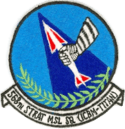568th Strategic Missile Squadron
| 568th Strategic Missile Squadron | |
|---|---|
|
First successful launch of an SM-68 Titan I ICBM at Cape Canaveral, Florida on 10 August 1960 at the Atlantic Missile Range | |
| Active | 1942-1945; 1962-1965 |
| Country |
|
| Branch |
|
| Type | Squadron |
| Role | Intercontinental ballistic missile |
| Garrison/HQ | Larson Air Force Base, Washington |
| Engagements |
World War II (EAME Theater) |
| Decorations |
Distinguished Unit Citation (2x) |
| Insignia | |
| 568th Strategic Missile Squadron emblem |
 |

The 568th Strategic Missile Squadron (568 SMS) is an inactive United States Air Force unit. It was last assigned to the 462d Strategic Aerospace Wing, stationed at Larson AFB, Washington
On 1 April 1961, the 568th Strategic Missile Squadron (ICBM-Titan) went on alert status as a Strategic Air Command (SAC) Intercontinental ballistic missile (ICBM) squadron, being equipped with the first-generation SM-68 Titan I, with a mission of nuclear deterrence.
The squadron was inactivated as part of the phaseout of the Titan I ICBM on 25 March 1965
History
World War II
First activated in early 1943 as a B-17 Flying Fortress heavy bomber squadron, it trained under the Second Air Force. It deployed to England in the European Theater of Operations (ETO) during July 1943 where it was assigned to VIII Bomber Command as a strategic bombardment squadron. The squadron participated in the air offensive over Nazi Germany and Occupied Europe until the German capitulation in May 1945. Its personnel demobilized in England and returned to the United States; the squadron was reassigned to the Second Air Force and was slated to be re-equipped with B-29 Superfortresses for deployment to the Pacific Theater. The Japanese capitulation led to the squadron's inactivation in August 1945, being neither manned or equipped.
The squadron was activated in the postwar Air Force Reserve as a B-29 unit in 1947 and inactivated due to budget reductions in 1949.
Intercontinental Ballistic Missile Squadron
It was re-activated in 1961 as a Strategic Air Command (SAC) HGM-25A Titan I ICBM launch unit. SAC placed the 568th Strategic Missile Squadron on operational status on 25 September 1962. The squadron was deployed in a 3x3 configuration, which meant a total of nine missiles were divided into three bases. Each base had three ICBMs ready to launch at any given time.
On 19 November 1964, Defense Secretary Robert McNamara announced the phase-out of the remaining first-generation SM-65 Atlas and Titan I missiles by the end of June 1965. Consequently, the Titan Is of the 568th SMS were removed from alert status on 4 January 1965. The last missile was shipped out on 8 February. The Air Force subsequently inactivated the squadron on 25 March.
Missile sites were later sold off to private ownership after demilitarization. Today the remains of the sites are still visible in aerial imagery, in various states of use or abandonment.
Lineage

- Constituted as the 568th Bombardment Squadron (Heavy) on 15 January 1943
- Activated on 26 January 1943
- Inactivated on 28 August 1945
- Re-designated as the 568th Bombardment Squadron (Very Heavy) on 28 January 1947
- Activated in the reserve on 27 February 1947
- Inactivated on 27 June 1949
- Re-designated as the 568th Strategic Missile Squadron and activated on 24 October 1960
- Organized on 1 April 1961
- Inactivated on 25 March 1965
Assignments
- 390th Bombardment Group, 26 January 1943 – 28 August 1945
- Second Air Force, 27 February 1947
- Tenth Air Force, 1 July 1948 – 27 June 1949.
- Strategic Air Command, 24 October 1960
- 4170th Strategic Wing, 1 April 1961
- 462d Strategic Aerospace Wing, 1 February 1963 – 25 March 1965
Stations
- Geiger Field, Washington, 26 January 1943
- Great Falls Army Air Base, Montana, 6 June-4 July 1943
- RAF Framlingham (AAF-153), England, 26 July 1943 – 6 August 1945
- Sioux Falls Army Air Field, South Dakota, 14–28 August 1945
- Lowry Field, Colorado, 27 February 1947 – 27 June 1949
- Larson AFB, Washington, 1 April 1961 – 25 March 1965
Aircraft and missiles

- B-17 Flying Fortress, 1943–1945
- B-29 Superfortress, 1947–1949
- SM-68 Titan I Missile 1961-1965
- Operated three missile sites: (1 Apr 1961-25 Mar 1965)
- 568-A, 8 miles N of Schrag, Washington 47°11′16″N 118°49′22″W / 47.18778°N 118.82278°W
- 568-B, 4 miles SSW of Warden, Washington 46°55′00″N 119°03′17″W / 46.91667°N 119.05472°W
- 568-C, 6 miles SE of Frenchman Hills, Washington 46°54′26″N 119°45′19″W / 46.90722°N 119.75528°W
See also
References
![]() This article incorporates public domain material from websites or documents of the Air Force Historical Research Agency.
This article incorporates public domain material from websites or documents of the Air Force Historical Research Agency.
- Maurer, Maurer, ed. (1983) [1961]. Air Force Combat Units of World War II (PDF) (reprint ed.). Washington, DC: Office of Air Force History. ISBN 0-912799-02-1. LCCN 61060979.
- Maurer, Maurer, ed. (1982) [1969]. Combat Squadrons of the Air Force, World War II (PDF) (reprint ed.). Washington, DC: Office of Air Force History. ISBN 0-405-12194-6. LCCN 70605402. OCLC 72556.
| ||||||||||||||||||||||||||||||||||||||||||||||||||||||||||||||||||
| |||||||||||||||||||||||||||||||||||||||||||||||


